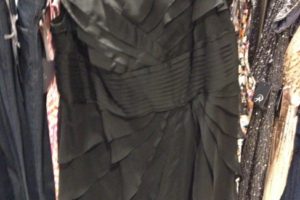Why Working With a Personal Stylist is Good for the Environment
Working with a personal stylist is an efficient way to hone your wardrobe and daily look — no question. Shopping and reworking your wardrobe with a professional who understands what works for your body type and personal style eliminates all the headache and guesswork. Shopping with someone who knows what brands to look for and where to find those brands is well worth the time and money.
And let’s not forget — it’s fun. There is just as much laughter as there is learning!
As satisfying as the process and end results are, the value for our clients extends beyond even what they see in the mirror and how it makes them feel.
Working with a DC Style Factory personal stylist isn’t just good for you, it’s good for the environment. A far reach you ask? Not really. Just check out the evidence.
Closet Organization
The first step in getting your wardrobe and personal style in order is the closet. Our most popular service is the Closet Audit. We come to the client’s home, go through his/her entire wardrobe, and decide what is and is not working. We purge, we organize, and we donate.
How does this help the environment, you ask? First, a cluttered closet often leads to purchases of the same clothing — yes believe it! We have seen the same exact garments two, three and sometimes four times in the same closet because the client could not find a pair of beloved black pants, blouse, etc. We save you time and money by creating a closet system that allows you to see what you have and what you truly need.
Second, the clothing we take away does not get thrown away. It is donated to A Wider Circle in Silver Spring, Maryland. The glamorous process of carting away your unwanted garments often looks (hilariously) like this. If clothing is too worn to be reused, particularly jeans, we will donate to Blue Jeans Go Green. This organization takes old, worn denim and upcycles it into insulation for homes. A portion of this insulation goes to communities in need each year.
We pride ourselves in helping our clients make environmentally thoughtful decisions about the clothing they keep and donate.
Shop Smart, Buy Less
In the 1930s, women had on average 30 pieces in their entire wardrobe. Today women have on average 120 pieces in their closets. People used to buy items because they needed them, but now there is “retail therapy,” “disposable fashion,” and “impulse shopping” dictating what goes in our closets.
At DC Style Factory, we are not die-hard advocates for minimalism, but we do have a couple of mantras when it comes to shopping: “Quality over quantity” and “Spend more, buy less.” I always tell our clients that we are not about filling your closet with clothing that is just going to sit there or end up discarded — potentially landfilled.
When we shop with clients we are strategic about what to buy and how much. We make sure pieces are versatile, can be worn across more than one season, and are of good quality for our client’s price point. We also talk about cost-per-wear. One pair of black pants that costs $200, is worn each week and lasts for years is better for your wallet and for the environment than the $30 pair that falls apart after a couple of months.
We encourage shopping for what you need instead of shopping sales that can often lead to failed purchases. We’ve all been there — it’s such a great deal, we couldn’t pass it up, but then, it just sits in our closet gathering dust and eventually gets tossed. We help you build a wardrobe that is not wasteful.
Knowledge About Eco-Friendly and Ethical Brands
More and more, people care. They want to know where their clothes are from, how they were made and by whom. We often work with clients that look to us for expertise on ethical brands, vegan clothing, sustainable clothing and more. We steer them to brands that prioritize the environment and the world. We scour what is out there and do the research so our clients don’t have to.
Some eco-friendly and ethical favorites are Everlane for its transparent production practices and modern, minimal basics; Asos Eco-Edit, which offers a one-stop-shop of all the top eco and ethical brands; Asos Africa, which has — for the last 11 seasons — promoted growth and empowerment in African countries; and Chitni Parker for its “buy better philosophy,” producing clothing in carefully selected factories and offsetting their carbon emissions through the Carbon Neutral Company guidelines. Also love EDUN and Stella McCartney, both leaders in this movement.
Clothing Storage and Care
Another area we advise clients about is clothing care. We will not discard a garment if we see it can be salvaged. For example, if a favorite sweater has a hole and we think it’s worth it to repair/reweave, we will make that recommendation. If a sweater looks old and “pilly,” we will suggest our favorite sweater comb to fix the issue.
When we shop with clients, we advise them on ways to care for their new garments: when to dry-clean (minimally), when to hand wash and how, when to throw in the dryer (just about never), how to safely get wrinkles out of clothing, how to pack up and store off-season clothing, and much more.
We want the work clients do with us to last. We want the clothing clients purchase to stand the test of time — both in terms of style and quality.
The longer your clothing stays in your closet, the better it is for your bottom line and for the environment.


 Rosana
Rosana